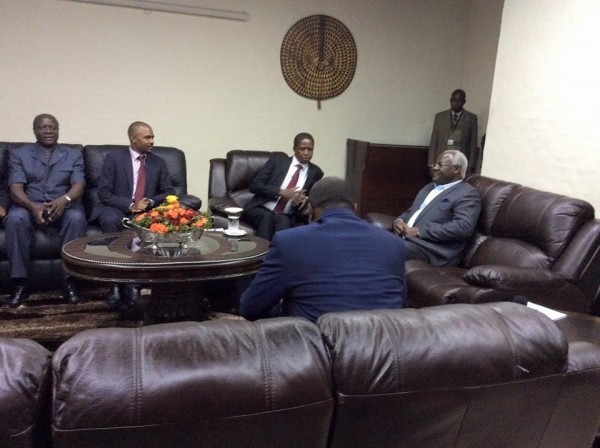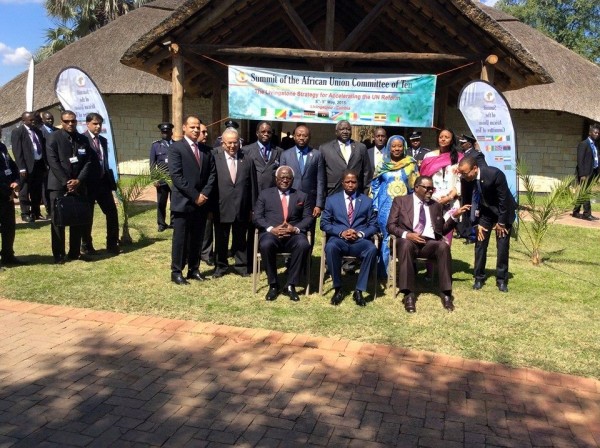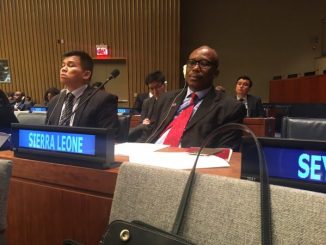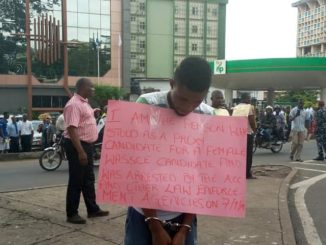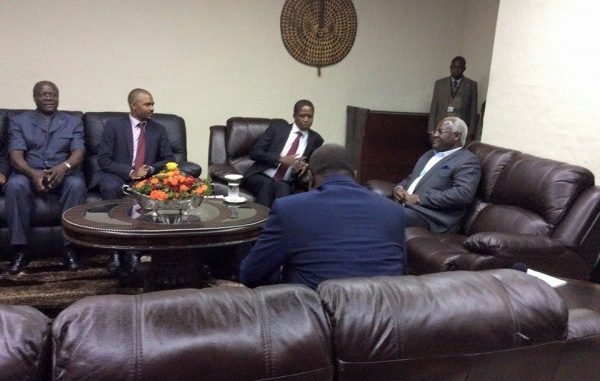
By State House Communications Unit :
As chairman, President Ernest Bai Koroma has called on his colleagues in the Committee of Ten (C-10) African Union Heads of States and Governments to ensure that they take their rightful place in the Security Council. The mandate of the C-10 is to deliver Africa’s position and perspectives on the reform of the United Nations.
The Committee has been holding series of consultations in different countries across Africa. At the summit on Saturday 10 April, 2015 held at David Livingstone Safari Lodge, Livingstone, Zambia, the host
President Edgar Chagwa Lungu reiterated his country’s committment to Africa’s aspirations:
”My government will remain committed to the aspirations of the C-10 whose Agenda is to spearhead the required reforms in the United Nations Security Council”. President Lungu also, on behalf of his colleague Heads of States and Governments, acknowledged the leadership role played by His Excellency, President President Ernest Bai Koroma of Sierra Leone on directing their affairs of the C-10.
President Lungu commended President Koroma’s resolve and leadership for keeping their focus on the responsibility before them.
To emphasize on that African focus and determination in achieving their avowed goal for equality and fairness at the UN, President Koroma reflected on what he called ”the very productive deliberations of the last summit held in Oyo, Republic of Congo Brazzaville”. He also made reference to the meeting of their Foreign Ministers and Permanent Representatives in New York and Addis Ababa – adding,
”that was the fourth in a row of those high level internal consultations, following their meetings in Freetown, Oyo and Nairobi.”
President Koroma reiterated that together they are demonstrating how profoundly committed they are in pushing Africa’s urgent case for equitable representation in the United Nations Security Council and to improve on the pace of progress in the reform process.
He recalled that 10 years ago, the C-10 was charged by the Africa Union with the responsibility of spearheading Africa’s Common Position on the reform of the Security Council. He added that their position, as enunciated in the Ezuluwini Consensus and Sirte Declaration, is well known and well articulated at the Intergovernmental Negotiations.
”..That today, as it was when the reform process was launched twenty years ago, Africa still remains the only region in the world that is not represented in the Permanent category of the Security Council the last outdated feature of the UN ”.
President Koroma did not mince his words in his condemnation of such an awkward situation:
”…is not acceptable that while the entire membership of the United Nations sympathizes with Africa for being the only region absent in the Permanent Category of the Security Council, there continues to be a lack of momentum in the Intergovernmental Negotiation process”.
The President went on to say that the African continent has, on its side, ”the inevitable truth of natural justice and it is high time the world corrected this moral and political imbalance against Africa and Africa is resolute on this”.
President Koroma went further to state that Africa will take its rightful place in the Security Council which includes seats in the permanent representations category.
”This demands that if other permanent representations from other regions have veto powers, Africa’s permanent representative must have veto powers” adding that ”Africa has not demanded more than other regions, we are only demanding equal treatment in the world’s premier body.”
President Koroma continued that, as a body, the C-10 reiterates its call to the entire membership of the United Nations to translate their genuine sympathies and support for the African Common Position into the requisite political will for meaningful progress towards achieving real reform of the Security Council.
He further appealed to conscience and strongly made the case for Africa. ”The voices of 1.1 billion people must not be ignored… the United Nations was founded seventy years ago on the principle of sovereign equality of all its members and seventy years on the organization has grown from an initial fifty one founding member states to one hundred and ninety three members”.
President Koroma described the United Nations as a ”truly remarkable story of mankind overcoming differences and cooperating in resolving international problems of economic, social, cultural, or humanitarian character. He suggested that it would be most befitting that as the UN celebrates this year, seventy years of its founding- the greatest human organization, it should ”confront the biggest challenge to the international security arrangements and seriously tackle what is perhaps the last outdated feature that urgently requires reform – the present composition, size and working methods of the security council”.
”This is time to correct the non representation and underrepresentation at the Council and to reflect in the actions, principles, objectives and ideals of the United Nations Charter for a fairer world based on universalism, equity and regional balance; said President Koroma.
He noted that 2015 is the year they conclude negotiations on a framework for the post 2015 Development Agenda and that the landmark commitment they made at the turn of the millennium in the form of the Millennium Development Goals, ends in 2015 and will be coming up for renewal.
He however cautioned that the year should not simply be a renewal of commitments and drawing up of renewed framework for global development and should also be a year for the renewal of the noble ideals of the United Nations for more democratic and fairer world. President Koroma emphasized that there is no better place to show fidelity to those ideals than to ensure that it has equitable representation for the regions of the world. The President said they must make 2015 a watershed year in the reform of the United Nations while acting in the larger interests of unity and mutual respect.
”This is the reason why this meeting in Livingstone is so important as it provides an opportunity to not only take a stock of progress since his fifteenth report to the African Union Summit in January this year by President Uhuru Kenyatta”.
President Koroma pointed out that in compliance with the AU Summit Decision in January 2015, their Foreign Ministers have been reaching out to the P5 members at their capitals and wherever the opportunity arises, canvass support for the African Common Position.
The President stressed that as they press forward with negotiations in the intergovernmental Negotiation, the committee is also mandated to intensify its outreach engagement at the highest political levels.
SHCU©2015

